
The Cricket World Cup is the international championship of One Day International (ODI) cricket. The event is organised by the sport's governing body, the International Cricket Council (ICC), every four years, with preliminary qualification rounds leading up to a finals tournament. The tournament is one of the world's most viewed sporting events and considered as the "flagship event of the international cricket calendar" by the ICC. It is widely considered the pinnacle championship of the sport of cricket.
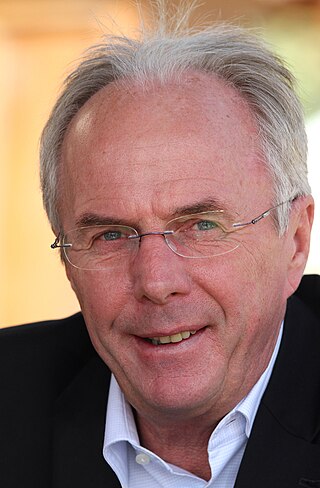
Sven-Göran Eriksson is a Swedish retired football manager and former player.

The English Football League Trophy, currently known as Bristol Street Motors Trophy for sponsorship reasons, is an annual English association football knockout competition open to all clubs in levels three and four of the English football pyramid, with the addition of 16 under-21 teams from Premier League and EFL Championship clubs since the 2016–17 season.
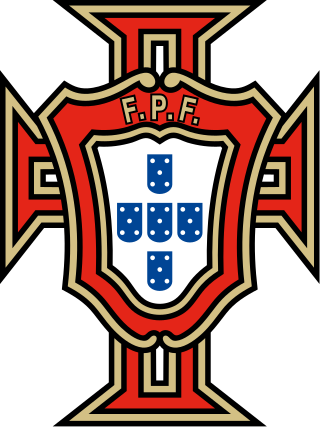
The Portugal national football team has represented Portugal in men's international football competitions since 1921. The national team is controlled by the Portuguese Football Federation (FPF), the governing body for football in Portugal. Portugal's home games are played at the Estádio Nacional stadiums in Portugal, and its primary training ground and technical headquarters, Cidade do Futebol, is located in Oeiras. The head coach of the team is Roberto Martínez, and the captain is Cristiano Ronaldo, who also holds the team records for most caps and most goals.

The Bulgaria national football team represents Bulgaria in men's international football, and is administered by the Bulgarian Football Union, a member association of UEFA.
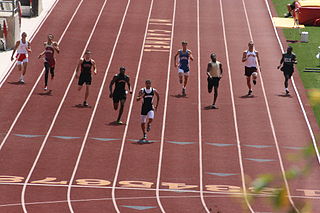
The 400 metres, or 400-meter dash, is a sprint event in track and field competitions. It has been featured in the athletics programme at the Summer Olympics since 1896 for men and since 1964 for women. On a standard outdoor running track, it is one lap around the track. Runners start in staggered positions and race in separate lanes for the entire course. In many countries, athletes previously competed in the 440-yard dash (402.336 m)—which is a quarter of a mile and was referred to as the "quarter-mile"—instead of the 400 m (437.445 yards), though this distance is now obsolete.

The 100 metres, or 100-meter dash, is a sprint race in track and field competitions. The shortest common outdoor running distance, the 100-meter (109.36 yd) dash is one of the most popular and prestigious events in the sport of athletics. It has been contested at the Summer Olympics since 1896 for men and since 1928 for women. The inaugural World Championships were in 1983.

The European Athletics Indoor Championships is a biennial indoor track and field competition for European athletes that is organised by the European Athletic Association. It was held for the first time in 1970, replacing the European Indoor Games, its predecessor event first held in 1966.

The 200 metres, or 200-meter dash, is a sprint running event. On an outdoor 400 metre racetrack, the race begins on the curve and ends on the home straight, so a combination of techniques is needed to successfully run the race. A slightly shorter race, called the stadion and run on a straight track, was the first recorded event at the ancient Olympic Games. The 200 m places more emphasis on speed endurance than shorter sprint distances as athletes predominantly rely on anaerobic energy system during the 200 m sprint. Similarly to other sprint distances, the 200 m begins from the starting blocks. When the sprinters adopt the 'set' position in the blocks they are able to adopt a more efficient starting posture and isometrically preload their muscles. This enables them to stride forwards more powerfully when the race begins and start faster.
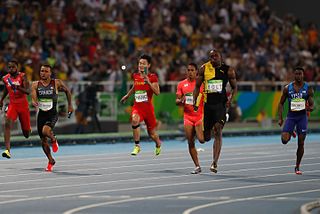
The 4 × 100 metres relay or sprint relay is an athletics track event run in lanes over one lap of the track with four runners completing 100 metres each. The first runners must begin in the same stagger as for the individual 400 m race. Each runner carries a relay baton. Before 2018, the baton had to be passed within a 20 m changeover box, preceded by a 10-metre acceleration zone. With a rule change effective November 1, 2017, that zone was modified to include the acceleration zone as part of the passing zone, making the entire zone 30 metres in length. The outgoing runner cannot touch the baton until it has entered the zone, and the incoming runner cannot touch it after it has left the zone. The zone is usually marked in yellow, frequently using lines, triangles or chevrons. While the rule book specifies the exact positioning of the marks, the colours and style are only "recommended". While most legacy tracks will still have the older markings, the rule change still uses existing marks. Not all governing body jurisdictions have adopted the rule change.
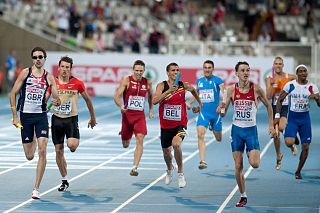
The 4 × 400 metres relay or long relay is an athletics track event in which teams consist of four runners who each complete 400 metres or one lap. It is traditionally the final event of a track meet. At top class events, the first leg and the first bend of the second leg are run in lanes. Start lines are thus staggered over a greater distance than in an individual 400 metres race; the runners then typically move to the inside of the track. The slightly longer 4 × 440 yards relay, on an Imperial distance, was a formerly run British Commonwealth and American event, until metrication was completed in the 1970s.
The World Aquatics Junior Swimming Championships is an international swimming championship event organized biennially by World Aquatics for swimmers aged 14–18 years as of the 31st December of the year of the competition. It is usually held on odd years. Prior to 2023, the event was known as the FINA World Junior Swimming Championships and was open to female swimmers aged 14–17 and male swimmers aged 15–18 as of the 31st of December of the year of the competition.
The European Junior Swimming Championships is an annual swimming competition for European swimmers organized by the Ligue Européenne de Natation and held over five days. The competitor age for females was 15 to 16 years; for males it is 17 to 18 years until 2015. From 2016 the competitor age is for females 14 to 17 years and for males 15 to 18 years.

The Diamond League is an annual series of elite track and field athletic competitions comprising fifteen of the best invitational athletics meetings. The series sits in the top tier of the World Athletics one-day meeting competitions.
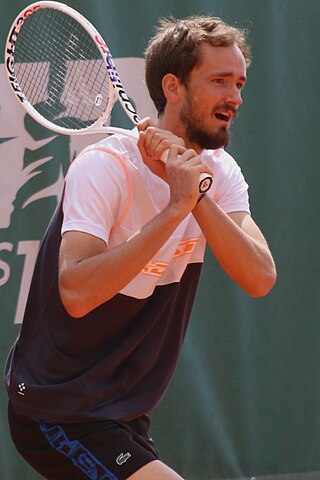
Daniil Sergeyevich Medvedev is a Russian professional tennis player. He has been ranked as high as world No. 1 in men's singles by the Association of Tennis Professionals (ATP), and is the current world No. 4. Medvedev has won 20 ATP Tour singles titles, including the 2021 US Open and 2020 ATP Finals. Medvedev defeated world No. 1 Novak Djokovic in the final to deny him the Grand Slam. In the latter, he became the only player to defeat the top three ranked players in the world en route to the year-end championship title. He has also won six Masters titles and contested six major finals. His six Masters titles all came in different venues, making him only the sixth player to win Masters titles at six different venues.











